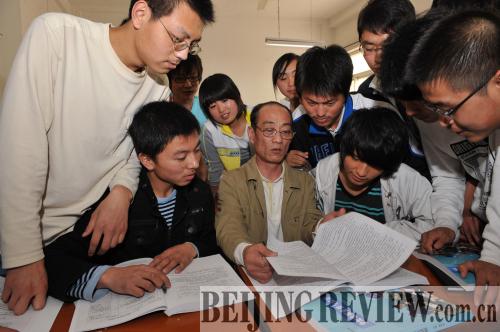|
 |
|
PRIORITIES: The nation needs professors who are devoted to teaching and academic research (XINHUA) |
Rural Modernization
Urbanization, in essence, is the expansion of urban areas resulting from the migration of the agricultural population. Yet the process is more complex than that.
In some cases, the expansion of big cities sharpens social unrest by widening the gap between the rich and the poor.
On one hand, an excessive supply of laborers has left big cities facing unemployment, expensive housing and environmental degradation. On the other hand, more and more farmers are deprived of their land with neither enough jobs nor sound social security to cover their losses. How long can this urbanization trend continue?
Some European countries have set good examples by developing modern agriculture. The Netherlands, for instance, has completed its urbanization process, but it still has a highly developed agriculture sector. Without the combination of city jobs with farm work, neither its cities nor rural areas would have achieved sustainable development.
Hence, urbanization means far more than simply the growth of urban areas. It includes the development of rural areas as well as their integration with cities.
Changjiang Times
Selling Streets
In Lanzhou, capital of Gansu Province, local authorities reportedly are planning to auction the naming rights to 14 city streets for a period of 15 years.
Naming a street after a company or brand-name product is an effective way to advertise as well as raise money for the city. But streets are public property, so their naming rights belong to the public. Street names should first and foremost remain consistent, so that people are able to find their way around. Besides, some street names commemorate certain historical figures or events, reflecting local culture. This is not something a company's name can embody.
Commercializing the naming of streets deprives the public of the right to manage public resources, and confuses the public by arbitrarily changing street names. Fifteen years from now, street names will have to be changed again and thus once again cause inconvenience to the public.
Recent years have seen many cases of public resources being sold to companies, such as street naming rights and the operating rights to certain public facilities. To reverse this trend, legal restrictions seem urgent.
Xinmin Evening News
Unreasonable Ban
Recently, the local government of Xi'an, capital of northwestern Shaanxi Province, declared a ban on searching and collecting waste in streets and alleys. According to the ban, ragpickers in the city are slowing down waste collection and transport as well as polluting the environment, affecting local residents' life.
Nowadays, ragpickers are seen in streets and alleys in many Chinese cities. In Xi'an alone, there are about 30,000 ragpickers.
From the perspective of urban management, the ban is not totally without reason, because ragpickers tend to upset dustbins as they search for the kind of waste they need. However, what they seek are recyclable items such as plastic bottles and aluminum cans. In this sense, they are also sorting rubbish and accelerating the classification and recycling of waste. Besides, most ragpickers are living in poverty, so the ban is undoubtedly cutting off their basic means of making a living.
Nowadays, some local authorities put too much emphasis on what they call order, while neglecting the overall balance of cities' development. Collecting useful rubbish and selling it for money is a basic right for those who are living in poverty. Authorities can't deprive ragpickers of their right to collect rubbish. If these ragpickers are barred from collecting rubbish, how do authorities expect them to make a living?
Qilu Evening News
Purify School
In recent years, the bureaucratization of China's higher education and the obsession with power among many professors have increasingly concerned the public.
In most higher learning institutions, officials can enjoy far better welfare benefits than faculty members. His or her living standards and social status are often beyond the reach of an average teacher.
The huge contrast encourages many college teachers to pursue officialdom rather than academic achievements. No wonder, then, that fewer and fewer professors are willing to focus on teaching and research.
With society's obsession with and worship of power, how can we expect good graduates from such universities?
It is time to separate the university management system from the teaching system. More rigid supervision systems should be put in place to monitor personnel and financial affairs of the higher education sector. Professors should not be executives. They should return to the field of teaching and research.
Yangtze Evening Post | 